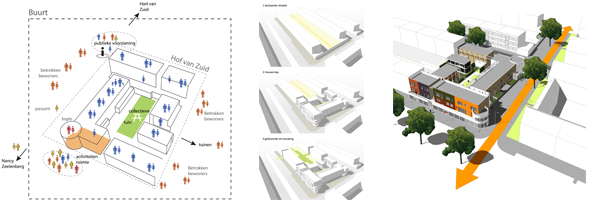Veldacademie congratulates Wessel Jonker on his graduation, in which he argues for the socialization of health care. Based on Collective Private Commissioning his plan offers economies of scale and an efficient form of living, with facilities for residents, but also for nearby neighbours. Collective purchase of care thereby is also an option. The care homes are designed ‘ready for care’ but have no stigmatizing character. For example the plan offers collective social sustainable homes where you can age well. This fits in with the challenge of achieving an affordable social infrastructure where residents have access to adequate social support and care that is tailored to needs, ow abilities and those of the environment.

Wessel Jonker
The Netherlands are ageing and society is changing. Social ties disappear as other arise; costs of health care vary greatly and less government provides a clear field of social initiatives. The government encourages the transformation of the welfare of a society where more responsibility and active citizenship stand central; a society in which everyone participates and contributes to one’s own capacity. Collective dwelling types play a key role when it comes to self-reliance of elderly residents.
The sixteen homes of Hof van Zuid are designed in Carnisse, in a place where staircase-access homes were built with great speed to alleviate the housing shortage at the time of reconstruction. Thereby the quality of public space was under pressure. By replacing the head of a staircase-access flat block the public space can be improved in the new design. Several staircase-access flats make way for new homes with more focus on the relationship between public and private areas. Parking on the plot makes the public space around the residence houses may increase. The shared garden is open during the day for visitors.
The design includes new access for existing homes through the head. Thus the entire block benefits of small-scale innovation, which may be part of a phased transformation while retaining much of the existing; a development that enhances the urban fabric but is far less invasive than a demolition-construction-scenario.
Collective Private Commissioning provides scale advantages. It is an efficient form of housing that facilitates that more generous services can be realized; Facilities for residents, but also for nearby neighbours. Collective purchase of health care is thereby also an option. The sharing of facilities facilitates a form of life which not only comes to sharing, but also to dividing. A shared living room with kitchen leads to this result: the social function is central. The homes are care ready designed but do not have a stigmatizing character. For example, the collective offers social sustainable homes in which you can age well. This fits in with the challenge of realizing affordable social infrastructure where residents have access to adequate social support and care that is tailored to needs, one’s own abilities and those of the environment.